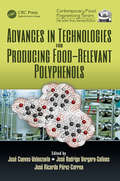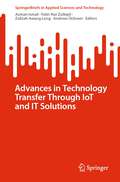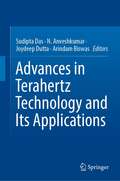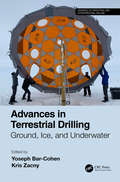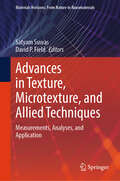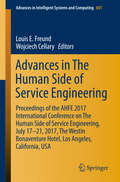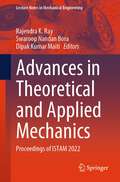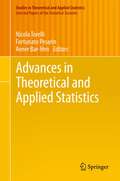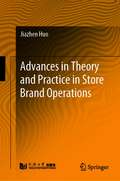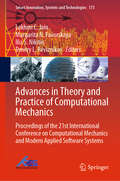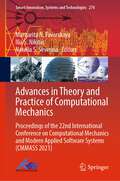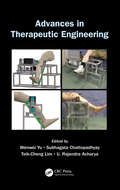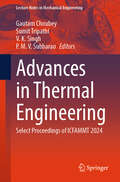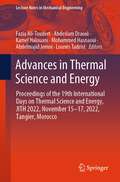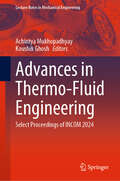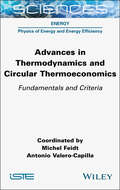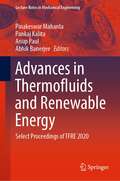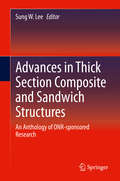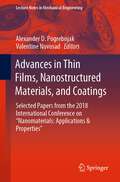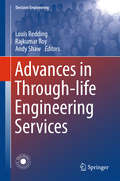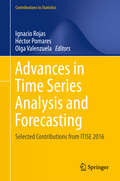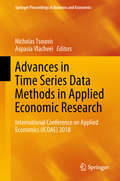- Table View
- List View
Advances in Technologies for Producing Food-relevant Polyphenols (Contemporary Food Engineering)
by José Cuevas-Valenzuela, José Rodrigo Vergara-Salinas and José Ricardo Pérez-CorreaThe growing concern for human wellbeing has generated an increase in the demand for polyphenols, secondary plant metabolites that exhibit different bioactive properties. This increasing demand is mainly due to the current applications in the food industry where polyphenols are considered essential for human health and nutrition. Advances in Technologies for Producing Food-relevant Polyphenols provides researchers, scientists, engineers, and professionals involved in the food industry with the latest methodologies and equipment useful to extract, isolate, purify, and analyze polyphenols from different available sources, such as herbs, flora, vegetables, fruits, and agro-industrial wastes. Technologies currently used to add polyphenols to diverse food matrices are also included. This book serves a reference to design and scale-up processes to obtain polyphenols from different plant sources and to produce polyphenol-rich foods with bioactive properties (e.g. antioxidant, antibacterial, antiviral, anticancer properties) of interest for human health and wellbeing.
Advances in Technology Transfer Through IoT and IT Solutions (SpringerBriefs in Applied Sciences and Technology)
by Andreas Öchsner Azman Ismail Fatin Nur Zulkipli Zalizah Awang LongThis book describes common applied problems that are solved with the use of digital technology. The digital technology has simplified most of our daily activities. Technology has been improving our quality of life where human capability alone is insufficient enough to be utilized. For any challenging tasks, digital technology helps to solve it in very efficient ways and thousands of them are solved on a daily basis without much notice in the public. Software and IT technology let us to complete tasks in just a moment that took days without this technical support. In that sense, this book presents several examples on how software- and IT-based solutions were successfully applied in solving actual engineering problems.
Advances in Terahertz Technology and Its Applications
by Joydeep Dutta Arindam Biswas Sudipta Das N. AnveshkumarThis book highlights the growing applications of THz technology and various modules used for their successful realization. The enormous advantages of THz devices like higher resolution, spatial directivity, high-speed communication, greater bandwidth, non-ionizing signal nature and compactness make them useful in various applications like communication, sensing, security, safety, spectroscopy, manufacturing, bio-medical, agriculture, imaging, etc. Since the THz radiation covers frequencies from 0.1THz to around 10THz and highly attenuated by atmospheric gases, they are used in short-distance applications only. The book focuses on recent advances and different research issues in terahertz technology and presents theoretical, methodological, well-established and validated empirical works dealing with the different topics.
Advances in Terrestrial Drilling: Ground, Ice, and Underwater
by Yoseph Bar-CohenAdvances in Terrestrial Drilling: Ground, Ice, and Underwater includes the latest drilling and excavation principles and processes for terrestrial environments. The chapters cover the history of drilling and excavation, drill types, drilling techniques and their advantages and associated issues, rock coring including acquisition, damage control, caching and transport, and data interpretation, as well as unconsolidated soil drilling and borehole stability. This book includes a description of the basic science of the drilling process, associated processes of breaking and penetrating various media, the required hardware, and the process of excavation and analysis of the sampled media. Describes recent advances in terrestrial drilling. Discusses drilling in the broadest range of media including terrestrial surfaces, ice and underwater from shallow penetration to very deep. Provides an in-depth description of key drilling techniques and the unified approach to assessing the required tools for given drilling requirements. Discusses environmental effects on drilling, current challenges of drilling and excavation, and methods that are used to address these. Examines novel drilling and excavation approaches. Dr. Yoseph Bar-Cohen is the Supervisor of the Electroactive Technologies Group (http://ndeaa.jpl.nasa.gov/) and a Senior Research Scientist at the Jet Propulsion Lab/Caltech, Pasadena, CA. His research is focused on electro-mechanics including planetary sample handling mechanisms, novel actuators that are driven by such materials as piezoelectric and EAP (also known as artificial muscles), and biomimetics. Dr. Kris Zacny is a Senior Scientist and Vice President of Exploration Systems at Honeybee Robotics, Altadena, CA. His expertise includes space mining, sample handling, soil and rock mechanics, extraterrestrial drilling, and In Situ Resource Utilization (ISRU).
Advances in Textile Waste Water Treatments (Sustainable Textiles: Production, Processing, Manufacturing & Chemistry)
by Subramanian Senthilkannan MuthuThe textile waste water is well known to contain many detrimental impacts in terms of its pollutants and the issues pertaining to its discharged without being untreated, or even discharged without meeting all stipulated parameters. There is an ample amount of advancements in treating textile waste water in a sustainable way and this book comprehends the same with eight insightful chapters. The aim of this book is to deal with the advances in sustainable waste water treatments with topics Conjugated Polymer Coated Novel Bio-adsorbents for Wastewater Treatment , Advanced Oxidation Processes (AOP) – Effective innovative treatment methods to degrade textile dye effluent, etc.
Advances in Texture, Microtexture, and Allied Techniques: Measurements, Analyses, and Application (Materials Horizons: From Nature to Nanomaterials)
by David P. Field Satyam SuwasThis book presents the fundamentals of texture and microtexture with the latest developments in the field and relates the same for different materials and processes. Crystallographic phase and orientation define the anisotropy of crystalline materials. In polycrystalline materials, the preferred crystallographic orientation of grain distributions, also known as (crystallographic) texture, controls the properties of materials. The evaluation of texture has been traditionally carried out by X-ray diffraction and neutron diffraction. In recent times, microtexture-based techniques have been widely used not only to examine the crystallographic texture but also to investigate the micro-mechanisms controlling the development of texture and microstructure. It has, therefore, become almost mandatory to re-visit the physical phenomenon associated with materials from the viewpoint of microtexture. The individual chapters have been written by the renowned scientists working in the respective domain. The book can be a valuable reference for researchers and professionals interested in fundamentals of texture and microtexture and allied fields.
Advances in The Human Side of Service Engineering: Proceedings of the AHFE 2017 International Conference on The Human Side of Service Engineering, July 17−21, 2017, The Westin Bonaventure Hotel, Los Angeles, California, USA (Advances in Intelligent Systems and Computing #601)
by Wojciech Cellary Louis E. FreundIf there is any one element to the engineering of service systems that is unique, it is the extent to which the suitability of the system for human use, human service, and excellent human experience has been and must always be considered. An exploration of this emerging area of research and practice, Advances in the Human Side of Service Engineeringcovers a broad spectrum of ergonomics and human factors issues highlighting the design of contemporary manufacturing systems. Topics include: Adoption of health information technology (HIT) Aging society: the impact of age on traditional service system constructs Anthropology in service science Applying service design techniques to healthcare Co-creating value Cognitive systems modeling of service systems Context-related service: the human aspect of service systems Designing services for underserved populations Ethics dividend in services: how it may be cultivated, grown, and measured Governance of service systems Human aspects of change when applying Lean Six Sigma methods and tools Human side of service dominant logic in B2B settings Human-computer interaction and HF in software technologies Service network configuration impacts on customer experience Simulating employees and customers in service systems Systems design and the customer experience Usability and human side of electronic financial services The book also discusses issues that arise in shop floor and office environments in the quest for manufacturing agility, i. e. enhancement and integration of human skills with hardware performance for improved market competitiveness, management of change, product and process quality, and human-system reliability. It provides a foundation upon which researchers and practitioners can contribute to this quickly evolving area and make lasting contributions.
Advances in Theoretical and Applied Mechanics: Proceedings of ISTAM 2022 (Lecture Notes in Mechanical Engineering)
by Dipak Kumar Maiti Rajendra K. Ray Swaroop Nandan BoraThis book presents select proceedings of the 67th Congress of the Indian Society of Theoretical and Applied Mechanics (ISTAM-2022). The content includes chapters on topics such as fluid mechanics, aerospace dynamics, atmospheric sciences and oceanography, geophysical environmental fluid dynamics, biomechanics, computational fluid dynamics, experimental methods in fluid dynamics, mathematical modelling, statistical mechanics, computational solid mechanics, experimental method in solid mechanics, mechanics of composites, and robotics and control. The book will be a valuable reference for researchers and professionals interested in applied and computational mechanics and allied fields.
Advances in Theoretical and Applied Statistics (Studies in Theoretical and Applied Statistics)
by Fortunato Pesarin Avner Bar-Hen Nicola TorelliThis volume includes contributions selected after a double blind review process and presented as a preliminary version at the 45th Meeting of the Italian Statistical Society. The papers provide significant and innovative original contributions and cover a broad range of topics including: statistical theory; methods for time series and spatial data; statistical modeling and data analysis; survey methodology and official statistics; analysis of social, demographic and health data; and economic statistics and econometrics.
Advances in Theory and Practice in Store Brand Operations
by Jiazhen HuoThis book is developed by focusing on the four issues: (1) product strategy of private brand; (2) pricing strategy of private brand; (3) channel strategy with private brand introduction; and (4) supply chain coordination with private brand introduction. Private brand (PB), also known as private label (PL) or store brand (SB), refers to a brand created and controlled by a retailer. In the 1960s and 1970s, private labels began to emerge in France and England. Although private label has grown rapidly worldwide, market share varies greatly from region to region. According to Nielsen's 2018 Global Private Label Report, the largest markets for private-label products are found primarily in the more mature European retail markets. In recent years, many large domestic retail enterprises have launched their own brand products. With the growth of e-commerce, some online retailers have also launched private-label goods. JD started to introduce its private brands in 2010, with annual sales of its private brand products reaching several hundred million yuan. However, at present, the market share of China's private label is only 1-3%, which still has a big gap compared with Europe and America.The main challenges to China's private label lie in private brand operations management. Among them, how to select the correct product categories, how to make pricing decision, how to restructure channels and how to coordinate supply chain after introducing private brands are four operations management problems need to be solved.
Advances in Theory and Practice of Computational Mechanics: Proceedings of the 21st International Conference on Computational Mechanics and Modern Applied Software Systems (Smart Innovation, Systems and Technologies #173)
by Lakhmi C. Jain Margarita N. Favorskaya Ilia S. Nikitin Dmitry L. ReviznikovThis book discusses physical and mathematical models, numerical methods, computational algorithms and software complexes, which allow high-precision mathematical modeling in fluid, gas, and plasma mechanics; general mechanics; deformable solid mechanics; and strength, destruction and safety of structures. These proceedings focus on smart technologies and software systems that provide effective solutions to real-world problems in applied mechanics at various multi-scale levels. Highlighting the training of specialists for the aviation and space industry, it is a valuable resource for experts in the field of applied mathematics and mechanics, mathematical modeling and information technologies, as well as developers of smart applied software systems.
Advances in Theory and Practice of Computational Mechanics: Proceedings of the 22nd International Conference on Computational Mechanics and Modern Applied Software Systems (CMMASS 2021) (Smart Innovation, Systems and Technologies #274)
by Margarita N. Favorskaya Ilia S. Nikitin Natalia S. SeverinaThis book is a collection of peer-reviewed best selected research papers presented at 22nd International Conference on Computational Mechanics and Modern Applied Software Systems (CMMASS 2021), held at the Alushta Health and Educational Center, The Republic of Crimea, during 4–13 September 2021. The proceedings is dedicated to solving the real-world problems of applied mechanics using smart computational technology. Physical and mathematical models, numerical methods, computational algorithms and software complexes are discussed, which allow to carry out high-precision mathematical modelling in fluid, gas and plasma mechanics, in general mechanics, deformable solid mechanics, in strength, destruction and safety of structures, etc. Smart technologies and software systems that provide effective solutions to the problems at various multi scale-levels are considered. Special attention is paid to the training of highly qualified specialists for the aviation and space industry.
Advances in Therapeutic Engineering
by U. Rajendra Acharya Teik-Cheng Lim Wenwei Yu Subhagata ChattopadhyayTherapeutic Engineering (TE) is a cutting-edge domain in today's era of medical technology research. Through engineering algorithms that provide technological solutions, it aims to elevate the quality of life of disabled individuals. Advances in Therapeutic Engineering describes various therapeutic processes and mechanisms currently applied to the
Advances in Thermal Engineering, Manufacturing, and Production Management: Select Proceedings of ICTEMA 2020 (Lecture Notes in Mechanical Engineering)
by Santanu Das Sadhan Kumar Ghosh Koushik Ghosh Pranab Kumar Dan Arijit KunduThis book presents the selected peer-reviewed proceedings of the International Conference on Thermal Engineering and Management Advances (ICTEMA 2020). The contents discuss latest research in the areas of thermal engineering, manufacturing engineering, and production management. Some of the topics covered include multiphase fluid flow, turbulent flows, reactive flows, atmospheric flows, combustion and propulsion, computational methods for thermo-fluid arena, micro and nanofluidics, renewable energy and environment sustainability, non-conventional energy resources, energy principles and management, machine dynamics and manufacturing, casting and forming, green manufacturing, production planning and management, quality control and management, and traditional and non-traditional manufacturing. The contents of this book will be useful for students, researchers as well as professionals working in the area of mechanical engineering and allied fields.
Advances in Thermal Engineering: Select Proceedings of ICFAMMT 2024 (Lecture Notes in Mechanical Engineering)
by V. K. Singh P. M. V. Subbarao Gautam Choubey Sumit TripathiThe 2nd International Conference on Futuristic Advancements in Materials, Manufacturing and Thermal Sciences (ICFAMMT-2024) was jointly organized by the Department of Mechanical and Aerospace Engineering, Institute of Infrastructure, Technology, Research and Management (IITRAM), Ahmedabad, India, and the Space Society of Mechanical Engineers (SSME), Space Applications Centre, ISRO, Ahmedabad. This conference aims to provide splendid opportunities for academicians, researchers, industrial persons, and young scientists to address new challenges and discuss futuristic advancements in materials, manufacturing, and thermal sciences. This book includes select peer-reviewed proceedings of the 2nd International Conference on Futuristic Advancements in Materials, Manufacturing and Thermal Sciences (ICFAMMT 2024). The contents of this book provide an overview of the latest research in the area of thermal and fluid sciences such as computational and numerical methods in fluid flow and heat transfer, advanced energy systems, battery thermal management system, technologies for space, and aerospace applications, supersonic combustion, two-phase/multiphase flows, measurement and instrumentation for fluid flow and transport properties, micro/nano-scale fluid flow and heat transfer. The book is useful for researchers and professionals working in the field of thermal and fluid sciences.
Advances in Thermal Science and Energy: Proceedings of the 19th International Days on Thermal Science and Energy, JITH 2022, November 15–17, 2022, Tangier, Morocco (Lecture Notes in Mechanical Engineering)
by Fazia Ali-Toudert Abdeslam Draoui Kamel Halouani Mohammed Hasnaoui Abdelmajid Jemni Lounès TadristThis book covers advanced theories and methods in the field of heat and mass transfer, which are expected to improve thermal systems performance and energy efficiency. It reports on novel findings relating to a wide range of topics in industry, building, transportation and agriculture. Offering a good balance of fundamental and applied research, this book provides scientists, engineers and other professionals with a timely snapshot on advances in thermal science, renewable energies and sustainable energy technologies. It also offers a source of inspiration for future research and collaborations.
Advances in Thermal Sciences: Select Proceedings of ICFAMMT 2022 (Lecture Notes in Mechanical Engineering)
by S. Suresh Vivek Kumar Singh Gautam ChoubeyThis book presents select peer-reviewed proceedings of the International Conference on Futuristic Advancements in Materials, Manufacturing and Thermal Sciences (ICFAMMT 2022). The book provides an overview of the latest research in the area of thermal sciences such as computational and numerical methods in fluid flow and heat transfer, advanced energy systems, optimization of thermal systems, technologies for space, and aerospace applications, supersonic combustion, two-phase / multiphase flows. The book will be useful for researchers and professionals working in the field of thermal sciences
Advances in Thermo-Fluid Engineering: Select Proceedings of INCOM 2024 (Lecture Notes in Mechanical Engineering)
by Achintya Mukhopadhyay Koushik GhoshThis book presents selected extended papers from the International Conference on Mechanical Engineering (INCOM 2024), describing recent advances in thermo-fluids engineering research. Various topics covered in this book are design and analysis of thermal systems, dynamics and control of thermal systems and processes, fluid mechanics, fluid–structure interaction, heat transfer, internal combustion engines and gas turbines, multiphase flow, and heat transfer. The book is a valuable reference for researchers and professionals working in the fields of mechanical, aerospace, chemical, and power engineering and also for a number of interdisciplinary areas like materials processing, electronic, and energy storage systems where thermal management is a key design issue.
Advances in Thermodynamics and Circular Thermoeconomics: Fundamentals and Criteria
by Michel Feidt Antonio Valero-CapillaThis book on energy physics and energy efficiency discusses two essential components of energy physics: the fundamentals and the criteria. It covers the historical basis of Carnot models, the thermostatic cycles of double-function heat pumps and the optimization of thermomechanical engines, and discusses the results of various investigations, bringing together a number of previous works. The latter half of this book introduces the concept of "Circular Thermoeconomics" and assesses the physical costs of recycling waste in increasingly complex industrial processes. It then goes on to present "Relative Free Energy", allowing us to create a new mathematical theory of thermodynamic costs in order to diagnose malfunctions in thermal systems. The book shows the progression of knowledge on the existence of successive energy, power and efficiency, and pairs this with the economic aspects, which are already becoming linked to growing environmental concerns.
Advances in Thermofluids and Renewable Energy: Select Proceedings of TFRE 2020 (Lecture Notes in Mechanical Engineering)
by Pinakeswar Mahanta Pankaj Kalita Anup Paul Abhik BanerjeeThis book comprises the select proceedings of the International Conference on Recent Trends in Developments of Thermofluids and Renewable Energy (TFRE 2020). The major topics covered include aerodynamics, alternate energy, bio fuel, bio heat transfer, computational fluid dynamics, control mechanism for constant power generation, and energy storage. The book also discusses latest developments in the fields of electric vehicles, hybrid power systems, and solar and renewable energy. Given the scope of its contents, this book will be useful for students, researchers, and professionals interested in the field of thermofluids and renewable energy resources.
Advances in Thick Section Composite and Sandwich Structures: An Anthology of ONR-sponsored Research
by Sung W. LeeThis book describes recent research findings on response and integrity of thick section composite and sandwich structures. In particular, it deals with these structures for marine applications under static and dynamic loads such as shock and slamming loads in severe sea environment including sea water, temperature extremes, hydrostatic pressure and Arctic conditions. Three-dimensional constitutive equations and failure criteria for structural response and integrity are considered. The book serves as an excellent repository of major advances in research on response and integrity of composite and sandwich structures made through research grants sponsored by the U.S. Office of Naval Research in the past decade. Collects major advances in response and integrity research;Emphasizes phenomena within severe environments;Illustrates underwater fluid-structure interactions, shock/blast loads, and slamming loads.
Advances in Thin Films, Nanostructured Materials, and Coatings: Selected Papers from the 2018 International Conference on “Nanomaterials: Applications & Properties” (Lecture Notes in Mechanical Engineering)
by Alexander D. Pogrebnjak Valentine NovosadThis book highlights the latest advances in chemical and physical methods for thin-film deposition and surface engineering, including ion- and plasma-assisted processes, focusing on explaining the synthesis/processing–structure–properties relationship for a variety of thin-film systems. It covers topics such as advances in thin-film synthesis; new thin-film materials: diamond-like films, granular alloys, high-entropy alloys, oxynitrides, and intermetallic compounds; ultra-hard, wear- and oxidation-resistant and multifunctional coatings; superconducting, magnetic, semiconducting, and dielectric films; electrochemical and electroless depositions; thin-film characterization and instrumentation; and industrial applications.
Advances in Through-life Engineering Services (Decision Engineering)
by Louis Redding Rajkumar Roy Andy ShawThis edited book offers further advances, new perspectives, and developments from world leaders in the field of through-life engineering services (TES). It builds up on the earlier book by the same authors entitled: "Through-life Engineering Services: Motivation, Theory and Practice. " This compendium introduces and discusses further, the developments in workshop-based and 'in situ' maintenance and support of high-value engineering products, as well as the application of drone technology for autonomous and self-healing product support. The links between 'integrated planning' and planned obsolescence, risk and cost modelling are also examined. The role of data, information, and knowledge management relative to component and system degradation and failure is also presented. This is supported by consideration of the effects upon the maintenance and support decision by the presence of 'No Fault Found' error signals within system data. Further to this the role of diagnostics and prognostics is also discussed. In addition, this text presents the fundamental information required to deliver an effective TES solution/strategy and identification of core technologies. The book contains reference and discussion relative to automotive. rail, and several other industrial case studies to highlight the potential of TES to redefine the product creation and development process. Additionally the role of warranty and service data in the product creation and delivery system is also introduced. This book offers a valuable reference resource for academics, practitioners and students of TES and the associated supporting technologies and business models that underpin whole-life product creation and delivery systems through the harvesting and application of condition and use based data.
Advances in Time Series Analysis and Forecasting: Selected Contributions from ITISE 2016 (Contributions to Statistics)
by Ignacio Rojas Héctor Pomares Olga ValenzuelaThis volume of selected and peer-reviewed contributions on the latest developments in time series analysis and forecasting updates the reader on topics such as analysis of irregularly sampled time series, multi-scale analysis of univariate and multivariate time series, linear and non-linear time series models, advanced time series forecasting methods, applications in time series analysis and forecasting, advanced methods and online learning in time series and high-dimensional and complex/big data time series. The contributions were originally presented at the International Work-Conference on Time Series, ITISE 2016, held in Granada, Spain, June 27-29, 2016. The series of ITISE conferences provides a forum for scientists, engineers, educators and students to discuss the latest ideas and implementations in the foundations, theory, models and applications in the field of time series analysis and forecasting. It focuses on interdisciplinary and multidisciplinary research encompassing the disciplines of computer science, mathematics, statistics and econometrics.
Advances in Time Series Data Methods in Applied Economic Research: International Conference On Applied Economics (icoae) 2018 (Springer Proceedings in Business and Economics)
by Nicholas Tsounis Aspasia VlachveiThis conference proceedings volume presents advanced methods in time series estimation models that are applicable various areas of applied economic research such as international economics, macroeconomics, microeconomics, finance economics and agricultural economics. Featuring contributions presented at the 2018 International Conference on Applied Economics (ICOAE) held in Warsaw, Poland, this book presents contemporary research using applied econometric method for analysis as well as country specific studies with potential implications on economic policy. Applied economics is a rapidly growing field of economics that combines economic theory with econometrics to analyse economic problems of the real world usually with economic policy interest. ICOAE is an annual conference started in 2008 with the aim to bring together economists from different fields of applied economic research in order to share methods and ideas. Approximately 150 papers are submitted each year from about 40 countries around the world. The goal of the conference and the enclosed papers is to allow for an exchange of experiences with different applied econometric methods and to promote joint initiatives among well-established economic fields such as finance, agricultural economics, health economics, education economics, international trade theory and management and marketing strategies. Featuring global contributions, this book will be of interest to researchers, academics, professionals and policy makers in the field of applied economics and econometrics.
